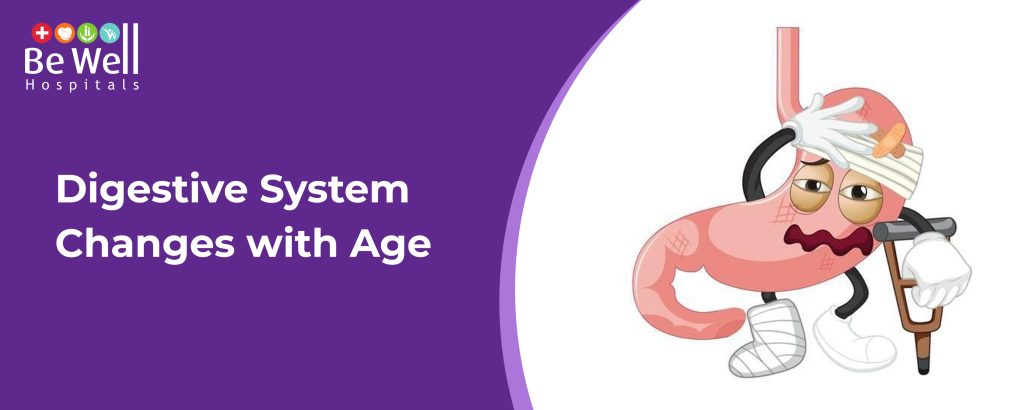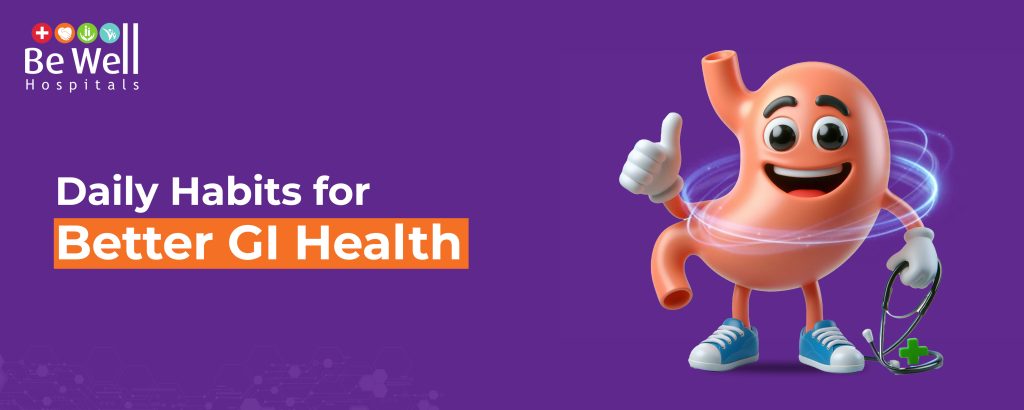
Introduction
As we age, changes occur in every part of the body—including the digestive system. The gastrointestinal (GI) tract, which plays a vital role in breaking down food and absorbing nutrients, becomes more vulnerable to functional slowdowns, structural changes, and chronic conditions. Older adults are more likely to experience issues such as constipation, acid reflux, bloating, diverticulosis, and even serious concerns like gastrointestinal bleeding or colon cancer. These problems are not just uncomfortable—they can interfere with nutrition, energy levels, and overall well-being. Moreover, digestive symptoms in the elderly are often more complex, harder to diagnose, and can be easily mistaken for normal signs of aging. That’s why proactive GI health monitoring becomes essential. In this blog, we’ll explore how aging impacts digestive health, common issues to watch for, and how early detection and specialized care can significantly improve quality of life and reduce health risks for seniors.
How the Digestive System Changes with Age
As we grow older, the digestive system undergoes several physiological changes that can affect how we process food, absorb nutrients, and eliminate waste. Understanding these changes is key to managing digestive health in older adults. Here are the primary ways aging impacts the digestive system:
- Slower digestion and motility: With age, the movement of food through the digestive tract slows down. This can lead to issues like constipation, bloating, and discomfort due to prolonged transit time in the intestines.
- Reduced saliva and stomach acid production: Older adults often produce less saliva and gastric acid, which are essential for breaking down food and absorbing nutrients. This can impair digestion and increase the risk of malnutrition and bacterial overgrowth.
- Weakened esophageal and intestinal muscles: Muscle tone in the esophagus and intestines can decrease with age, making swallowing more difficult and reducing the efficiency of bowel movements. This may contribute to problems like dysphagia and irregular bowel habits.
- Altered gut microbiome: The diversity and balance of gut bacteria tend to change over time, potentially leading to inflammation, weakened immunity, and gastrointestinal discomfort. A disrupted microbiome can also affect mood and cognitive health.
- Slower liver and pancreatic function: Aging can reduce liver size and blood flow, impacting the metabolism of medications and toxins. The pancreas may also produce fewer digestive enzymes, which can hinder the breakdown of fats, proteins, and carbohydrates.
Recognizing these age-related changes allows for better dietary choices, timely medical care, and lifestyle adjustments to maintain optimal digestive health well into the later years.

Common Gastrointestinal Conditions in Seniors
As people age, their risk of developing gastrointestinal (GI) issues increases due to changes in digestion, muscle function, medication use, and overall health status. Here are some of the most common GI conditions affecting seniors:
- Constipation is extremely common among older adults, often caused by slower bowel motility, decreased physical activity, medications (like painkillers or iron supplements), and a low-fiber diet.
- Gastroesophageal Reflux Disease (GERD) becomes more frequent with age as the muscles at the lower end of the esophagus weaken, allowing stomach acid to flow back and cause heartburn or discomfort.
- Diverticulosis and Diverticulitis involve the formation of small pouches in the colon wall, which can become inflamed or infected. These conditions are often related to low fiber intake and aging colon walls.
- Irritable Bowel Syndrome (IBS) can persist or emerge in later life, characterized by abdominal pain, bloating, and irregular bowel habits, often worsened by stress or dietary triggers.
- Peptic Ulcers are open sores in the stomach or upper intestine lining, frequently linked to NSAID use (like aspirin or ibuprofen) and Helicobacter pylori infection, both of which are common in older adults.
- Gallstones can form as bile composition changes with age, leading to abdominal pain, nausea, and potential complications like gallbladder inflammation or bile duct obstruction.
- Liver Disease in seniors may include non-alcoholic fatty liver disease (NAFLD), cirrhosis, or damage due to long-term alcohol use, hepatitis, or metabolic disorders, affecting detoxification and digestion.
- Colorectal Cancer risk significantly increases with age, making regular screening crucial. Symptoms can be subtle, including changes in bowel habits, unexplained weight loss, or rectal bleeding.
- Swallowing difficulties (Dysphagia) may occur due to weakened throat muscles, neurological conditions, or structural issues, potentially leading to malnutrition or aspiration pneumonia.
Understanding these conditions and managing them with early intervention, appropriate diet, medications, and specialist care can greatly enhance quality of life for the elderly and reduce complications.
Warning Signs Seniors Should Not Ignore
As we age, our digestive system undergoes significant changes, and it becomes especially important to recognize symptoms that may indicate a more serious underlying gastrointestinal issue. Here are key warning signs older adults should never ignore:
- Unexplained weight loss may be an early sign of malabsorption, cancer, chronic infection, or other serious health problems. When weight drops without intentional dieting, it’s time to consult a doctor.
- Changes in bowel habits, such as persistent constipation, diarrhea, or a sudden shift in stool frequency or consistency, can signal conditions like colorectal cancer, irritable bowel syndrome, or infections.
- Persistent abdominal pain or bloating that does not subside could point to issues like ulcers, diverticulitis, gallstones, or even gastrointestinal cancers. Regular or worsening discomfort warrants medical attention.
- Difficulty swallowing (dysphagia) is often overlooked but could result from esophageal disorders, neurological conditions, or even cancer. It can lead to nutritional deficiencies or aspiration if untreated.
- Blood in stools or black/tarry stools may be a sign of bleeding in the digestive tract, such as from ulcers, hemorrhoids, polyps, or more serious issues like colorectal cancer. This symptom should never be ignored.
- Nausea or vomiting that lasts more than a day or two may indicate infections, gallbladder disease, bowel obstructions, or other urgent conditions that require immediate medical evaluation.
For seniors, even subtle symptoms can signal significant issues. Timely attention to these signs can lead to early diagnosis, effective treatment, and better health outcomes.
Prevention and Daily Habits for Better GI Health
Promoting gastrointestinal (GI) health becomes increasingly vital with age, and adopting certain daily habits can go a long way in maintaining smooth digestion and preventing serious conditions. Here are practical ways to support better GI health every day:
- Staying hydrated is essential for proper digestion and preventing constipation, especially in older adults who may naturally feel less thirsty. Drinking adequate water helps move food and waste through the digestive system efficiently.
- Eating smaller, more frequent meals can reduce bloating, acid reflux, and indigestion. This habit eases the digestive burden on the stomach and is particularly helpful for those with slower gastric motility.
- Physical activity promotes overall metabolic health, increases gut motility, and lowers the risk of constipation. Even light exercises like walking or yoga can make a significant difference in digestive function.
- Regular screenings, particularly for colon cancer after the age of 50, are crucial. Early detection of polyps or cancer can lead to timely intervention and better outcomes. Routine check-ups also help monitor other GI conditions.
- Limiting alcohol and quitting tobacco can drastically reduce the risk of GI diseases including ulcers, liver disease, and cancers of the digestive tract. These lifestyle choices also improve the body’s ability to absorb nutrients effectively.
By integrating these habits into daily life, older adults can protect their digestive system, prevent complications, and enjoy a better quality of life well into their senior years.

Conclusion
Aging well isn’t just about staying physically active or mentally sharp—it also includes maintaining strong digestive health. For seniors, digestive wellness plays a vital role in overall well-being, affecting everything from energy levels to nutrient absorption and quality of life. It’s important to understand that gastrointestinal discomfort is not simply a normal part of getting older. Bloating, constipation, reflux, or sudden changes in digestion may be signs of an underlying issue that needs attention. Regular check-ups, mindful eating habits, staying hydrated, and timely medical intervention can prevent minor concerns from becoming serious problems. Most importantly, seniors should feel empowered to speak up about GI symptoms without brushing them off as “just old age.”
With the right care, support, and awareness, aging can be healthier and more comfortable. To ensure your loved ones receive expert digestive care, visit the Gastroenterology Department at Be Well Hospitals or call 9698 300 300 to book an appointment today.

